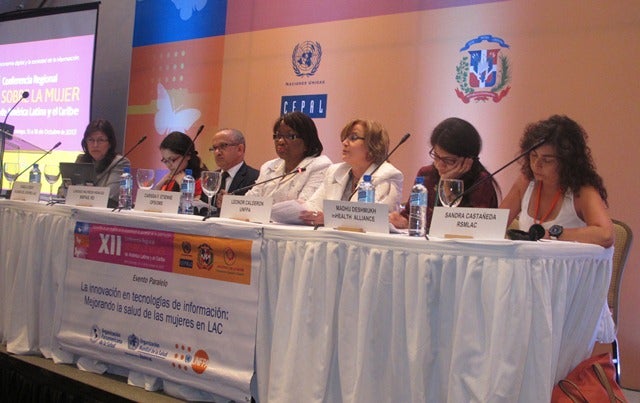

Information and communications technologies (ICTs) are a potentially powerful tool for reducing gender inequities in health, said Pan American Health Organization (PAHO) Director Carissa F. Etienne today at a conference on women's autonomy in the digital economy and the information society. She urged the formation of partnerships to support and promote the use of ICTs to improve women's health.
Santo Domingo, Dominican Republic, 15 October 2013 (PAHO/WHO) - Information and communications technologies (ICTs) are a potentially powerful tool for reducing gender inequities in health, said Pan American Health Organization (PAHO) Director Carissa F. Etienne today at a conference on women's autonomy in the digital economy and the information society. She urged the formation of partnerships to support and promote the use of ICTs to improve women's health.

PAHO Director (center) joins representatives of UNFPA, NGOs and the Ministry of Health of the Dominican Republic to discuss the use of information and communication technologies (ICTs) to improve women's health
"PAHO/WHO believes that information and communication technologies are critical to ensuring advances in universal health coverage and health outcomes, as well as in advancing the agenda on women's rights and gender equality," said Etienne. "We recognize that optimizing the use of technologies requires political commitment in all sectors of government and in partnership with the private and public sectors. Together, we can ensure that ICT revolution advances women's rights and gender equality, including the right to health."
Etienne's remarks came at the opening ceremony of the 12th session of the Regional Conference on Women in Latin America and the Caribbean, which is being held in Santo Domingo this week. She noted that ICTs can be used to expand women's access to health care and health information, to improve data collection, and to enhance both the efficiency and the quality of care. But taking full advantage of these opportunities requires effective coordination among stakeholders both within and outside of the health system, she said.
Supporting women's health through ICTs can strengthen accountability and capacity building through the implementation of innovative systems and services, as in the case of the UN Commission on Information and Accountability for Women's and Children's Health. ICTs can also be an important tool in advancing health equality among and within countries — a critical issue for Latin America and the Caribbean.
PAHO/WHO is currently working to overcome health barriers through its Regional Strategy and Plan of Action on eHealth, which promotes the development of national eHealth plans, coordinated efforts among stakeholders to improve the health of women through technologies, and standardized data collection with variables to allow health inequities analysis.
PAHO/WHO is also facilitating the exchange of information on eHealth. In conjunction with the United Nations Population Fund (UNFPA), the organization is co-hosting, a special side-event to this week's conference titled "Technology, Information and Communication — Improving Women's Health in Latin American Countries." Panelists will discuss advances and critical challenges globally, regionally and nationally in the utilization of ICTs to address women's health, focusing on actions to improve access to health care for women through innovative technologies.
Participants in the Oct. 16 PAHO/WHO—UNFPA side event will include PAHO Director Carissa F. Etienne; Dr. Lorenzo Wilfredo Hidalgo, Minister of Health of the Dominican Republic; Dr. Lenor Caldeon, of UNFPA; Madhu Deshmukh, Director of Maternal and Child Health, mHealth and Gender at the mHealth Alliance; and Camila Csery of the Latin American and Caribbean Alliance of Youth towards Cairo + 20. Ana Elena Badilla, Regional Advisor on Gender and Youth at UNFPA, will moderate the panel, and Sandra Castañeda, General Coordinator of the Latin America and the Caribbean Women's Health Network (RSMLAC for its abbreviation in Spanish) will give the closing remarks.



